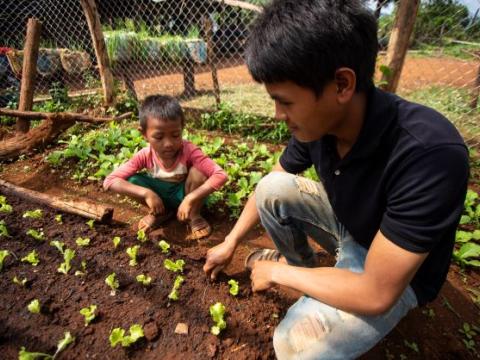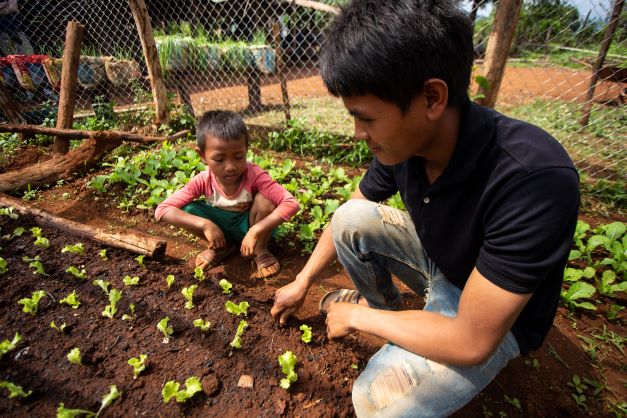No More Hunger: Ministry of Health, European Union, Australia and World Vision enabled vulnerable communities to tackle malnutrition despite COVID-19

Friday, 16th September 2022

World Vision International – A father and his child are planting lettuce in their new home garden in Saravane province, sustaining the new source of diversified food and nutrients for their family.
150 rural communities from Attapeu, Saravane, and Savannakhet provinces have seen their lives changed over the past five years, with improved nutrition for the most vulnerable mothers and their children despite all the challenges brought by COVID-19 and climate hazards.
On Friday 16th of September, the Department of Hygiene and Health Promotion of the Ministry of Health, the European Union, the Australian Embassy, and World Vision co-chaired the National Closing Ceremony of the Accelerating Healthy Agriculture and Nutrition (AHAN) Project with the total cost of 11 M€ including 10 M€ of EU contribution. The ceremony aimed at concluding five years of the project’s implementation, sharing out the key findings of the recent end-line evaluation with the stakeholders and policy-makers towards nutrition, including various ministries of the Government of Lao PDR, development partners, UN agencies, and other Non-Governmental organisations.
With activities related to agriculture and livelihoods, mother and child’s health, improved access to water, hygiene and sanitation, and gender equality, around 140,000 individuals from the twelve districts supported by AHAN have benefitted from an integrated, holistic approach to tackling the roots of malnutrition and the technical expertise from the consortium of four organisations led by World Vision, and the financial support of the European Union, with additional funds from the Australian Department of Foreign Affairs and Trade (DFAT) for Saravane province.
The key findings of the end-line assessment of the project indicate that:
- 70% of families are now food secured all year round, a major breakthrough compared to the 11% assessed during the baseline of the project (2018), and despite the COVID-19 pandemic;
- Stunting rates in children under five years old have decreased from 47% to 29% in three years, meaning that more than 2 in 3 children have the adequate height for their age;
- Underweight rates in children under five years old have also decreased from 34% to 26%, meaning that more than 3 in 4 children have adequate weight for their age;
All those achievements and their sustainability are also explained by the strong multi-sector coordination the project has been setting up with different ministries of the Government of Lao PDR, including the Ministries of Health, Agriculture and Forestry, and Lao Women’s Union, from the central to the provincial, and district levels, implementing all activities hand-in-hand with Government stakeholders and village authorities to ensure this impact is maintained.
During the learning event, various stakeholders shared their views on the impact of the AHAN Project. Mr. Vincent Vire, Head of Cooperation of the European Union Delegation to Lao PDR, highlighted: “the EU is very proud to have contributed through AHAN to a major change in the life of thousands of people in three provinces, greatly improving the food security, nutrition and sanitary situation in these areas. These are very concrete outcomes delivered under our broader partnership with the Lao PDR to improve nutrition, through promoting a multi-sectoral approach in health, agriculture, and education.”. Dr. Phonepaseuth Ounaphom, Director General of the Department of Hygiene and Health Promotion, Ministry of Health, also said: “AHAN positively impacts our department by decreasing malnutrition rate at the village, creating a management system at the grassroots level, and supports better coordination between local village health volunteers and health centres. Even after the project ends, health staff and village volunteers will carry on the work because the project has involved and engaged them from the beginning: this contributes to sustainability.”
Now coming to an end, the five-year project is currently phasing out from the communities, leaving a durable legacy to them through new knowledge, equipment, and more importantly ownership of the activities that added a pattern to their lives and changed their behaviours. Indeed, AHAN did more than pursue sustainable development goals: it created a new dynamic in the communities and Government ministries, ensuring all people have the common grounds to sustain and create a better life for their children and future generations.